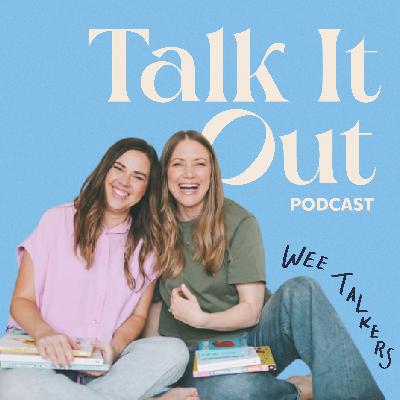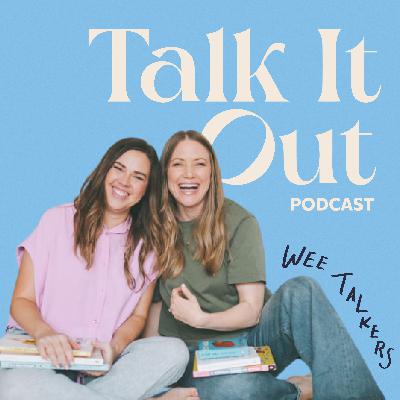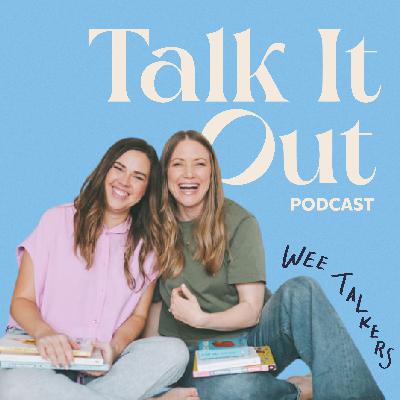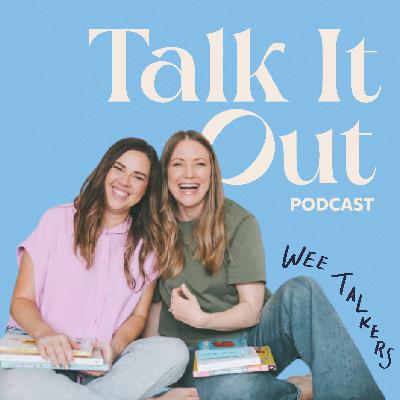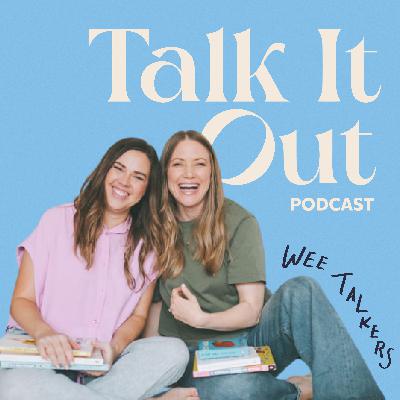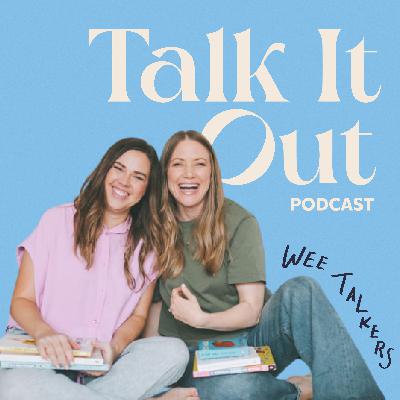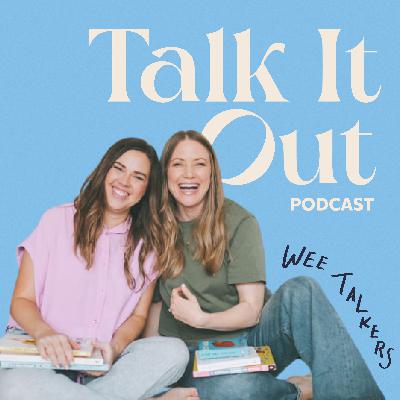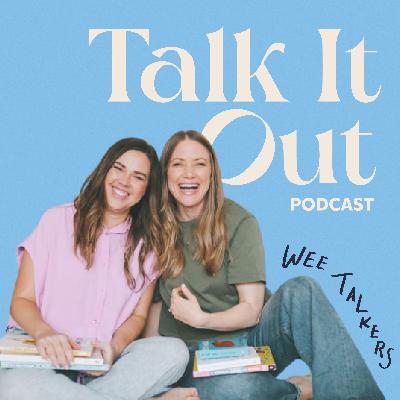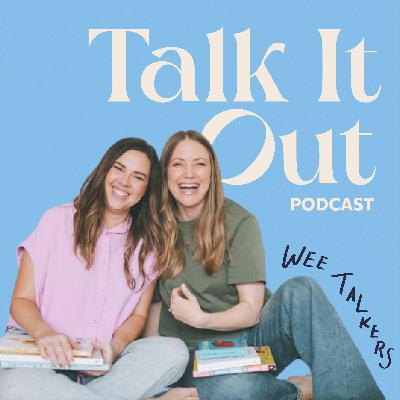Discover Talk it Out with Wee Talkers
Talk it Out with Wee Talkers

Talk it Out with Wee Talkers
Author: Carly Tulloch and Katie Sterbenz
Subscribed: 9Played: 36Subscribe
Share
© 2025 Wee Talkers
Description
Helping you nurture your child's speech and language development with confidence! Hosted by Carly and Katie, pediatric speech therapists and moms, this podcast is packed with practical tips, expert insights, and encouragement to help your child thrive in speech and language development. Whether you're wondering about milestones, curious about how to best support your child, or choosing the best books and toys, we're here to help—without the overwhelm. Tune in for answers to your biggest questions, relatable stories, and plenty of encouragement along the way!
31 Episodes
Reverse
Overwhelmed by the toy aisle (or your living room floor)? You're not alone. In this episode, Katie and Carly (pediatric speech language pathologists and moms of six) share how to choose toys that truly stand the test of time. They'll walk you through what really matters when it comes to toys for babies, toddlers and preschoolers: choosing open-ended toys that encourage imagination, quality over quantity, and picking toys that meet your child where they are developmentally. You'll also hear their favorite tried-and-true toys that spark language, connection, and creativity (and the ones that tend to just gather dust). Whether you're shopping for the holidays or just ready to simplify playtime, this episode will help you feel confident choosing toys that actually support your child's language development. 💡 Mentioned in this episode: Wee Talkers' 2025 Holiday Gift Guide at https://www.weetalkers.com/blog/gift-guide 15% off tubby todd tubbytodd.com/weetalkers Movement toys: https://shopmy.us/shop/collections/2709002 Toys that help communication development: https://www.weetalkers.com/blog/toys-for-encouraging-communication-development Our favorite bubbles
We absolutely love the library, but we know it can be overwhelming. Families often wonder: Should you pick the educational books? The fun, silly ones? Are some books "better" than others? What if they want to read the same book over and over? In this episode, we're sharing simple tips to take the stress out of library trips and help you make the most of this incredible resource. Here's what we're covering: Why regular library visits are one of the easiest ways to support your child's language and literacy skills Four simple things to look for when choosing books What we think about reading the same books over and over Practical library hacks to save you time (and keep things fresh for you and your child) A free resource to help you skip the guesswork and head to the library our booklist As pediatric speech-language pathologists and moms, we know firsthand how powerful regular, joyful reading can be (and how overwhelming the library can feel without a plan). We hope this episode leaves you feeling confident, equipped, and excited to make your next library trip a fun, stress-free part of your routine. Thank you for listening! If you find this episode helpful, share it with a friend or leave a review. We'd love to reach more families who want to support their little one's communication and love of books. Resources Mentioned in This Episode: Free Toddler Booklist: https://www.weetalkers.com/books-download Songs+ Stories Membership: Screen time you can feel really good about it. Try it free https://www.weetalkers.com/trial
It's typical for toddlers and preschoolers not to be able to say all speech sounds correctly. It's a learning process. Maybe your child says "tar" for star or "nana" for banana. But how do you know if it's just a normal stage or something more? In this episode, we're digging into the question: Should I be worried if my toddler says sounds "wrong"? Here's what we're covering: Why speech errors happen How much of your toddler's speech you should be able to understand at different ages The most common sound mistakes toddlers make and when they typically go away Four simple, low pressure ways you can help your child at home Sound-specific strategies for tricky ones like /s/ blends (think star or snake) When to consider checking hearing or connecting with a speech-language pathologist As pediatric speech therapists and moms, we want you to know: most of the time, these mistakes are a completely normal part of learning to talk. We hope this episode helps you you walk away with reassurance, a few simple ideas to try, and the confidence to trust your instincts if you feel something more is going on. If you found this episode helpful, share it with a friend or leave a review. It's SO appreciated. Thanks for listening! Resources mentioned in this episode: Ep. 10: What to Do When You Don't Understand Your Toddler Our blog: Common Speech Sound Patterns in Toddlers Looking for screen time you can feel good about? Try Songs+Stories free for 10 days www.weetalkers.com/trial Free Toddler Communication Checklist – weetalkers.com/toddler More free resources + programs at weetalkers.com
Parenting little ones is full of trial and error. Some choices you look back on and think, I'm so glad we did that. Others? You wish you'd done a little differently. In this episode, we're reflecting on those early years now that we have school-aged kids and sharing: 5 simple habits we're thankful we stuck with — like making room for open-ended play, encouraging a love of books, and keeping quiet time even after naps were long gone. The everyday choices that paid off more than we realized at the time 5 things we wish we had done more of (still kicking ourselves for not writing down all those funny kid quotes!) Why you don't need to do everything perfectly for it to really matter As speech language pathologists and moms, we bring both our professional lens and the honest, behind-the-scenes perspective of real parenthood. Our hope? That you walk away with a new idea to try or the reassurance that what you're already doing is enough. 👉 Don't forget to share this episode with a friend who could use a little encouragement. Resources mentioned in this episode: Want to create a screen time plan for your family that you feel really good about? Listen to episode 13 to hear more about what we think about when it comes to screen time for toddlers and preschoolers. More about baby + toddler play plus our favorite toys to encourage talking at weetalkers.com/blog Try our intentional screen time for preschoolers + toddlers (for free) at weetalkers.com/trial Find the chew proof, rip proof books we mentioned in our Amazon or Bookshop store. More free resources and programs at weetalkers.com
Is your 18-month-old not talking yet, but clearly understands so much of what you say? You're not alone. And the fact they understand so much is a very encouraging sign! In this episode, Katie and Carly (speech-language pathologists and moms) break down: The difference between receptive (understanding) and expressive (talking) language What language milestones to expect around 18 months What actually counts as a word (hint: more than you think!) Three simple ways you can support your toddler's talking right now When to seek extra support and why "wait and see" isn't always the best plan If you've been feeling worried, this conversation will give you practical next steps and lots of reassurance. 👉 Download our free Toddler Communication Milestones checklist at weetalkers.com/toddler. 👉 Checkout our TalkToddler course--our course for parents who want to help their toddler talk and communciate more weetalkers.com/talktoddler.
Starting preschool or daycare? We've been there—more than six times between us! In this episode, we share our best tips for easing the preschool transition, from choosing books that prepare your child to creating goodbye routines that actually work. You'll hear real stories from our own kids, easy role play ideas, a simple connection routines for drop-off, and a preschool playlist to help your preschooler start the day feeling brave and confident. Links & Resources: Shop our favorite books for starting school: Amazon | Bookshop.org Personalized Starting School Books from Pinhole Press Kind + Strong Playlist on Spotify & Apple Music Free 10-Day Songs+Stories Trial How to Support Social Skills in the Preschool Years
You've probably heard of kids having their tonsils or adenoids removed—but how do you know when it's actually necessary? In this episode of Talk It Out, we're joined by board-certified pediatrician Dr. Anjuli Gans to break down everything parents need to know about tonsils and adenoids in children. From their role in the body to the signs that they might be causing problems, Dr. Gans helps make sense of this often confusing part of pediatric health. Dr. Gans is an attending physician at the Children's Hospital of Philadelphia, an Assistant Clinical Professor at the University of Pennsylvania, and the founder of Resilient Rascals. As a pediatrician and mom of two, she shares evidence-based, holistic advice to help parents make confident healthcare decisions. In this conversation, we talk about what tonsils and adenoids actually do, how to spot signs of enlargement, and when it might be time to seek a referral to an ENT (ear, nose, and throat specialist). Dr. Gans also walks us through what to expect if your child needs a tonsillectomy or adenoidectomy, how to prepare your child for surgery, and her best tips for a smooth recovery. Plus, Katie shares her personal experience having two of her children go through T&A surgery—and what she wishes she had known sooner. If you're wondering whether your child's snoring, mouth breathing, or frequent illness might be related to enlarged tonsils or adenoids, this episode offers clarity, expert insight, and plenty of reassurance. If your child snores, struggles with sleep, seems to get sick often, or has had tonsils and adenoids mentioned at a doctor's visit—this episode will help you feel more informed and confident. Mentioned in this episode: 🎧 Missed our last episode with Dr. Gans? Check out Episode 21 on Ear Infections + Speech Development How to Prepare for a Tonsillectomy and Adenoidectomy from resilientrascals.com Connect with Dr. Gans: Visit Dr. Gan's website: resilientrascals.com Follow Dr. Gans on Instagram: @resilientrascals Dr. Gans' guides – we love these! Connect with us: 🎧 More episodes of Talk It Out📱 Follow us on Instagram
Picky eating is one of the most common concerns for parents of toddlers—but how do you know if it's a normal phase or something more serious? In this episode of Talk It Out, we're joined by Jenny Friedman, a pediatric dietitian, picky eating specialist, and mom of three. Together, we dive into what picky eating looks like in toddlers, how to reduce mealtime stress, and what actually works when your child refuses to eat. Whether your toddler is down to just a handful of foods or you're dealing with a new wave of food refusals, this conversation is filled with practical, low-pressure strategies to help. Jenny breaks down what typical toddler picky eating looks like, common misconceptions parents have, and signs it might be time to seek extra support. She also shares simple ways to help your toddler try new foods without pressure, tips for creating a positive mealtime environment, and how to think about nutrition when your child is eating very little. We also talk about: The small signs of progress that often go unnoticed but really matter Mindset shifts for parents who feel stuck or overwhelmed Easy snack ideas that even selective eaters tend to accept Our experiences in our own homes when it comes to feeding kids If you're looking for realistic picky eating tips for toddlers, or just want to feel less alone in the daily mealtime battles, this episode offers the support and expert insight you need. Resources from this episode: Jenny's free masterclass: Peace Out Picky Eating jennyfriedmannutrition.com/peace Her book: Stories of Extreme Picky Eating Get it here Follow Jenny on Instagram: @feedingpickyeaters Jenny's picks for high chairs Jenny's breakfast ideas for picky eaters Connect with us: 💛 www.weetalkers.com 🎧 More episodes of Talk It Out📱 Follow us on Instagram THANK YOU TO OUR SPONSOR: Little Spoon: Use the code WEETALKERS to get 30% off your first order at littlespoon.com/weetalkers. Little Spoon offers delicious, nutritious meals and snacks for babies, toddlers, and big kids—delivered right to your door. The quality is so good! We think your family will love it.
If your toddler has had multiple ear infections, you're not alone—and if you've ever wondered how those infections might impact their speech or language development, this episode is for you. We're joined by Dr. Anjuli Gans, a board-certified pediatrician with over a decade of experience, an attending physician at the Children's Hospital of Philadelphia, and Assistant Clinical Professor of Pediatrics at the University of Pennsylvania. She's also the creator of Resilient Rascals, where she shares evidence-based, down-to-earth advice on pediatric health—and she's a mom of two. We've learned so much from Dr. Gans over the years and are thrilled to have her on the podcast. But first, Katie shares her personal story of navigating chronic ear infections with her son, how it affected his early development, and what happened after getting PE tubes. In the episode we discuss why toddlers are especially prone to ear infections, how ear infections can impact speech and language development, and what's really going on when there's fluid in your child's ears. You'll learn how fluid affects hearing, when antibiotics are necessary (and when they might not be), and how to know if it's time to see a pediatric ENT. We also explain what pressure equalization (PE) tubes are and when they can be helpful. Most importantly, we share what to do if you're feeling stuck or worried about your child's communication—because you're not alone, and there are ways to help. If you've ever felt overwhelmed by ear infections, unsure of the next step, or concerned about your toddler's speech and language, we hope this episode helps you feel a little more informed—and a lot more supported. Resources Mentioned: Get our free Toddler Milestone Checklist to track your child's communication skills Wee Talkers programs to support families How Recurring Ear Infections Affect Speech Development Connect with Dr. Gans: Visit Dr. Gans' website: resilientrascals.com Follow Dr. Gans on Instagram: @resilientrascals More information about Ear Infections from Dr. Gans Connect with us: 💛 Wee Talkers Website 🎧 More episodes of Talk It Out📱 Follow us on Instagram
In this episode of Talk It Out, Carly and Katie are tackling a topic that so many families face: toddler frustration—especially when it's linked to speech and language delays. If you've ever watched your child melt down because they can't quite say what they're trying to express, you are far from alone. This episode explores why late talkers tend to show more frequent or intense frustration and how parents can both understand and support them. Carly and Katie, pediatric speech language pathologists, explain the natural mismatch that often happens in toddlers who understand more than they can say—and how this gap can lead to outbursts, shutting down, or behaviors like hitting and biting. They share practical ways to recognize when frustration is rooted in communication challenges and offer clear, compassionate guidance for what to do in the moment and outside the moment to help. You'll learn how to model simple language, use sign support, validate emotions, and create more calm and connection—while still holding important boundaries. Carly and Katie also talk about why dysregulation makes language harder, and how showing up as a calm, responsive presence can go a long way. Reminder for you: if your toddler is struggling, it's not your fault—and there's so much you can do to help. Resources Mentioned in this Episode: Speech + Language Milestone Checklist, a helpful resource for understanding what's typical at each stage of toddler development, and how to know when it might be time for extra support. You can download it at weetalkers.com/toddler. Social emotional book recommendations – Bookshop.org | Amazon Songs+Stories Membership – A high-quality screen-time option that encourages language and literacy through engaging storytime videos. TalkToddler Course – Help your toddler say more words and improve their communication.
Thumb sucking super common and a very natural things for babies to do—but when is it time to start guiding them away from it? In this episode, we're covering: The pros and cons of thumb sucking How prolonged thumb sucking can affect speech and tooth development Gentle, practical strategies to help your child break the habit when they're ready Carly's personal experience with her daughter's thumb-sucking journey If you're wondering when or how to support your child through this transition, this episode will give you ideas you can tailor to your family's approach—without making it a battle. Key Takeaways: Most kids stop thumb sucking on their own between ages 3 and 6. Gradual changes—like keeping hands busy, offering alternatives, and reducing triggers—can help. A child-led approach often leads to smoother, more lasting success. If you're concerned about speech or dental development, check in with a professional. At the end of the day, thumb sucking is just one small piece of your child's development, and you know them best. However this journey looks for your family, you're doing an incredible job supporting them every step of the way. If this episode was helpful, we'd love for you to subscribe and share it with a friend who might need it. Thanks for being here—we're so grateful for you! Thank You to our Sponsor: Lovevery: Use the code WEETALKERS15 to save $15 off your first play kit.
Feeding a toddler can feel like a wild ride—one minute they love broccoli, the next they won't touch it. Sound familiar? In this episode, we're joined by Jess and Nita from Happy Healthy Eaters—two Registered Dietitians (and fellow moms!) who make baby and toddler feeding feel a whole lot more doable. We love their work, and wanted to bring the conversation here to Talk it Out! In the episode we cover: Why toddlers suddenly get more picky What to do when they won't eat veggies How to keep them sitting at the table Easy snack ideas Tips for handling different-aged siblings at mealtimes You're going to feel so much more confident after this one! RESOURCES MENTIONED IN THIS EPISODE: Free Snack + Mealtime Guide Supporting your Toddler at the Table Guide Oat balls recipe Happy Healthy Eaters Instagram THANK YOU FOR SPONSORING THIS EPISODE, Melissa & Doug We're longtime fans of their pretend play food sets— we've used them in therapy with clients and with our own kids at home. Toys that spark creativity and learning? Yes, please. Use the code WEETALKERS20 to receive 20% off sitewide (coupon valid May 26, 2025-June 1, 2025. Typical exclusions apply). Thanks Melissa & Doug for supporting this episode and for making toys that help kids play with purpose. 💛
Ever wonder when your baby will start babbling—or what to do if they aren't yet? Babbling is more than just adorable baby chatter—it's a key milestone that lays the foundation for talking. In this episode, we're covering: The stages of babbling and how they build toward first words Why some babies start babbling earlier than others Simple, everyday ways to encourage more babbling at home What to do if your baby isn't babbling yet By the end of this episode, you'll know what to expect, how to support your baby's early language development, and when to seek extra support if needed. Resources Mentioned: Baby & Toddler Milestone Checklists – Track your child's progress and learn what comes next: weetalkers.com/baby (for babies) | weetalkers.com/toddler (for toddlers) Talk Baby Course – A step-by-step guide to boosting your baby's communication skills: weetalkers.com/talkbaby Wee Talkers Blog – More tips on first words and early communication: weetalkers.com/blog Thank You to our Sponsor: Lovevery: Use the code weetalkers15 to save $15 off your first play kit. If you found this episode helpful, be sure to subscribe so you don't miss the next one. And if you know another parent who'd love this, send it their way! Thank you so much for your support!
We're sharing something a little different on the podcast today—a special Songs+Stories podcast episode from inside our membership, just for your little one to enjoy! SONGS+STORIES Our guilt-free screen time videos support their development. Without causing meltdowns! Join and get instant access to safe, ad-free content that's: ✓ Taught by speech therapists ✓ Calm, slow-paced + low-stim ✓ Similar to library story time ✓ Streamed privately (no YouTube!) EXCLUSIVE FOR PODCAST LISTENERS: Get $10 off your first month of Songs+Stories when you use code talkitout at checkout. Books Featured in this Episode: Dozens of Doughnuts by Carrie Finison I'll Wait, Mr. Panda by Steve Antony
Potty training can feel like a big transition for any family—but when your little one isn't talking much yet, it can feel even trickier. The good news? Words aren't required for potty training success! In this episode, we're sharing: Why you don't need to wait for your child to talk before starting potty training 5 ways to prepare your child before transitioning out of diapers Communication strategies that work even if your child isn't using words yet How to use signs, pictures, and routines to make the process easier Our personal experiences with potty training and what worked for our kids Potty training is really potty learning—it's a skill that takes time! But with the right strategies in place, you can help your child navigate this milestone with less frustration and more confidence. Resources Mentioned: Songs+Stories Membership – Includes a potty training storytime and engaging videos to support early communication: weetalkers.com/songsandstories Talk Toddler Course – A step-by-step guide to helping your child communicate more: weetalkers.com/talktoddler Potty Training Book Recommendations – Find them linked in our Amazon storefront or Bookshop.org Free Toddler Milestone Checklist – Know what's coming next in your child's development Connect with us on instagram @weetalkers You know your child best, and no matter how this process unfolds, you're doing an amazing job. If this episode was helpful, we'd love for you to subscribe and share it with a friend who's navigating potty training too. Thanks for spending this time with us! 💛
Today we're joined by Erin Morrison—also known as The Conscious Mom on Instagram—for a conversation that feels like a deep breath. Erin is a Certified Conscious Parenting Coach with two master's degrees in psychological counseling from Columbia University. She's also a mom of two, and brings a grounded, compassionate, and non-judgmental approach to her work with parents. In this episode, we talk about how to stay regulated during toddler meltdowns, how to bring more mindfulness into your day (even when life feels full), and why small, simple shifts can make a big difference in how you feel as a parent. Erin also shares the heart behind her new book, why she chose a bite-sized format, and a few of her favorite things she's loving right now. In this episode, we cover: Erin's go-to strategy for when you're feeling overwhelmed Easy ways to add mindfulness to your daily routines Trusting yourself in motherhood The writing process behind Erin's new book—and why she kept it simple What she wished she knew when she was a new mom A few fun things Erin's loving right now Freebie for this episode: Get a 10-day free trial of our Songs+Stories membership—screen time that actually supports your toddler's language and literacy development. Try it free here → www.weetalkers.com/storyvideo Connect with Erin: Follow her on Instagram → @the.conscious.mom Learn more → theconsciousmom.com
Screen time—it's one of the most debated parenting topics out there. But instead of an all-or-nothing approach, what if there was a way to make it work for your family without constant battles or guilt? In this episode, we're breaking it down: The 3 Cs framework to help guide your screen time decisions The 4 screen time rules we started when our kids were young (and still rely on today!) Why not all screen time is created equal—and how to choose better options The screen time setup that reduces meltdowns and keeps it from taking over your day Whether you're struggling with screen time limits, wondering how much is too much, or just looking for a simple plan that works for your family, this episode will give you practical, realistic strategies you can start using right away. Resources Mentioned: Songs+Stories Membership – A library of slow-paced, language-rich videos designed by speech therapists: weetalkers.com/songsandstories Baby & Toddler Milestone Checklists – Track your child's development and know what comes next: weetalkers.com/baby (for babies) | weetalkers.com/toddler (for toddlers) Wee Talkers Blog – More screen time tips and language development insights: weetalkers.com/blog At the end of the day, screens are just one small piece of your parenting journey—and you're doing an incredible job navigating it all. There's no perfect formula, just the choices that feel right for your family. So take a deep breath, trust yourself, and know that your little one is lucky to have you. If this episode gave you some helpful ideas, we'd love for you to subscribe and share it with a friend who might need to hear this today. Thanks for spending this time with us—we're so grateful to have you here! 💛 Thank You to Our Sponsor: Glo Pals: Use the code weetalkers15 to save 15% off your order.
Is your child not copying your words yet? Wondering if that's normal—or what you can do to help? Imitation is one of the first building blocks of communication, and in this episode, we're diving into: How imitation develops step by step—from actions and gestures to sounds and words Why some kids pick up movements before they start talking Practical strategies to encourage your child to copy you more What might be happening if your child isn't imitating yet You'll walk away with a better understanding of where your child is in their communication journey and simple ways to support their progress at home. Important time stamps: 1. The progression: how imitation develops- 2:50 2. How to help your child imitate more- 9:23 3. Reasons your child might have trouble imitating - 15:00 Resources Mentioned: Toddler Milestone Checklist – Track your child's progress and learn what to expect next: weetalkers.com/toddler Imitation Development Progression – Check out our blog for a visual breakdown of how imitation unfolds: weetalkers.com/blog Songs+Stories Membership – A high-quality screen-time option that encourages imitation, gestures, and language through engaging storytime videos: weetalkers.com/songsandstories Gestalt Language Processing – Wondering if your child is a gestalt language processor? We highly recommend learning from our SLP friend, Nicole Casey, and checking out her resources: childled.org Talk Toddler Course – Learn step-by-step how to support your child's language at home: weetalkers.com/talktoddler Instagram: @weetalkers — we'd love to connect with you! Subscribe & Share! If you found this episode helpful, please subscribe to the podcast and share it with a fellow parent or caregiver who might be struggling with getting their child to copy words. Your support helps us continue providing quality resources for families to help little ones communicate with confidence.
We've loved connecting with you in Season 1 of Talk It Out with Wee Talkers! While we take a short break to prepare for Season 2, we want to share some helpful resources for you. In This Episode, We Cover: How to submit a question for Season 2: Visit weetalkers.com/questions to record and send us your question about baby or toddler speech and language development. The Wee Talkers Blog: Explore helpful articles on topics like "what to do if your toddler isn't talking," book recommendations, and indoor activities for toddlers at weetalkers.com/blog. Our online courses: Learn how to support your child's language development from infancy through toddlerhood with our TalkBaby and TalkToddler courses. The Songs+Stories Membership: Thoughtfully designed screen time for toddlers with ad-free, slow-paced videos and a podcast for kids. Try a few sample episodes in our Talk It Out podcast feed (look for the "Bonus" episodes)! Resources Mentioned: Submit your question for Season 2: weetalkers.com/questions Read the Wee Talkers Blog: weetalkers.com/blog Explore our baby & toddler language courses: www.weetalkers.com/our-programs Join the Songs+Stories Membership: weetalkers.com/songsandstories Thank you for being part of Talk It Out with Wee Talkers! We can't wait to be back soon with Season 2. In the meantime, take care, and we'll talk again soon!
What to Do When You Can't Understand Your Toddler | Talk It Out Podcast Welcome to another episode of Talk It Out with Wee Talkers! Today, we're tackling a question that so many parents have: What should you do when you can't understand what your toddler is saying? Carly and Katie answer a question from a dad who feels unsure of what to do when his 17-month-old tries to communicate, but he just can't figure out what he's saying. They share practical, research-backed strategies to help toddlers feel heard, reduce frustration, and strengthen that parent-child connection—even when words aren't clear yet. If you've ever struggled to understand your toddler's speech—or worried about whether their pronunciation is normal—this episode is packed with expert advice to help you navigate these tricky moments with confidence. What You'll Learn in This Episode: Why toddler speech can be hard to understand (and what's normal) How to respond when you don't understand your child's words 5 simple strategies to reduce frustration and keep communication positive Why some toddlers get more upset than others when they're misunderstood When to be concerned about your toddler's speech clarity 🔗 Links & Resources Mentioned: Related Podcast Episode: Toddler Speech Mistakes (Episode 5)– Learn what's typical for toddler speech development Blog Post: When You Can't Understand Your Toddler – Get more tips and real-life examples Late Talker Support: How to Reduce Toddler Frustration Around Communication Free Toddler Milestone Checklist: Download your copy at weetalkers.com/toddler Follow Us: Instagram: @weetalkers Wee Talkers Blog: WeeTalkers.com/blog Subscribe & Share! If you found this episode helpful, please subscribe to Talk It Out with Wee Talkers! Share it with a fellow parent or caregiver who might be struggling to understand their toddler's speech. Your support helps us continue providing expert-backed tips to help little ones communicate with confidence. 🎧 Thanks for listening!


